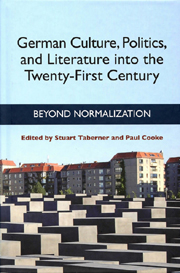Book contents
- Frontmatter
- Contents
- Acknowledgments
- Introduction
- 1 “Normalization”: Has Helmut Kohl's Vision Been Realized?
- 2 Coping with Disparity: Continuity and Discontinuity in Economic Policy since Unification
- 3 Understanding Germany: The Limits of “Normalization” and the Prevalence of Strategic Culture
- 4 “Normalization” through Europeanization: The Role of the Holocaust
- 5 “Representing Normality”: Architecture in Berlin
- 6 “Normalizing” the Past: East German Culture and Ostalgie
- 7 National Memory's Schlüsselkinder: Migration, Pedagogy, and German Remembrance Culture
- 8 The Return of “Undead” History: The West German Terrorist as Vampire and the Problem of “Normalizing” the Past in Margarethe von Trotta's Die bleierne Zeit (1981) and Christian Petzold's Die innere Sicherheit (2001)
- 9 “Normalizing” the “Old” Federal Republic? The FRG between 1949 and 1989 in Recent German Fiction
- 10 Reconciliation between the Generations: The Image of the Ordinary German Soldier in Dieter Wellershoff's Der Ernstfall and Ulla Hahn's Unscharfe Bilder
- 11 “(un)sägliche Vergleiche”: What Germans Remembered (and Forgot) in Former Yugoslavia in the 1990s
- 12 “Normal” as “Apolitical”: Uwe Timm's Rot and Thomas Brussig's Leben bis Männer
- 13 “Narrative Normalization” and Günter Grass's Im Krebsgang
- 14 From “Normalization” to Globalization. German Fiction into the New Millennium: Christian Kracht, Ingo Schulze, and Feridun Zaimoğlu
- 15 Abnormal Consensus? The New Internationalism of German Cinema
- Notes on the Contributors
- Index
10 - Reconciliation between the Generations: The Image of the Ordinary German Soldier in Dieter Wellershoff's Der Ernstfall and Ulla Hahn's Unscharfe Bilder
Published online by Cambridge University Press: 05 February 2013
- Frontmatter
- Contents
- Acknowledgments
- Introduction
- 1 “Normalization”: Has Helmut Kohl's Vision Been Realized?
- 2 Coping with Disparity: Continuity and Discontinuity in Economic Policy since Unification
- 3 Understanding Germany: The Limits of “Normalization” and the Prevalence of Strategic Culture
- 4 “Normalization” through Europeanization: The Role of the Holocaust
- 5 “Representing Normality”: Architecture in Berlin
- 6 “Normalizing” the Past: East German Culture and Ostalgie
- 7 National Memory's Schlüsselkinder: Migration, Pedagogy, and German Remembrance Culture
- 8 The Return of “Undead” History: The West German Terrorist as Vampire and the Problem of “Normalizing” the Past in Margarethe von Trotta's Die bleierne Zeit (1981) and Christian Petzold's Die innere Sicherheit (2001)
- 9 “Normalizing” the “Old” Federal Republic? The FRG between 1949 and 1989 in Recent German Fiction
- 10 Reconciliation between the Generations: The Image of the Ordinary German Soldier in Dieter Wellershoff's Der Ernstfall and Ulla Hahn's Unscharfe Bilder
- 11 “(un)sägliche Vergleiche”: What Germans Remembered (and Forgot) in Former Yugoslavia in the 1990s
- 12 “Normal” as “Apolitical”: Uwe Timm's Rot and Thomas Brussig's Leben bis Männer
- 13 “Narrative Normalization” and Günter Grass's Im Krebsgang
- 14 From “Normalization” to Globalization. German Fiction into the New Millennium: Christian Kracht, Ingo Schulze, and Feridun Zaimoğlu
- 15 Abnormal Consensus? The New Internationalism of German Cinema
- Notes on the Contributors
- Index
Summary
“Normal ist der Tod.”
— Adorno, Minima MoraliaEs war normal / daß zu allen Seiten gestorben wurde / und normal war / das unmittelbare Bevorstehen des eigenen Todes/
Die Täterländer sind zugedeckt mit einem notorischen Geplapper über Auschwitz […] Merken wir, daß unter diesen Wörtern in den Debatten die Toten immer mehr verschwinden, vergessen werden als wirklich Ermordete? Und, indem wir es merken, müssen wir noch mehr reden, noch mehr tun. So wird, indem wir schweigend ins Gespräch vertieft sind, die Shoah das, was sie immer war: Unwirklich. Deshalb kann es keine Normalität geben.
The lines cited above, the first set taken from Die Ermittlung, Peter Weiss's 1965 play about the Auschwitz trials in Frankfurt in the early 1960s, and the second from a 1999 essay by the Austrian-Jewish author Robert Schindel, attempt to give voice to the experience of the victims of Nazism. Each of the quotations also highlights the difficulties inherent in a German wish for “normality.” Weiss, then, warns us that a confrontation with the everyday normality of the victim experience might undercut the very concept of normality, if normality comes to be seen as the destruction of civilization in Auschwitz. Schindel suspects that the hidden desire in the memory discourse of the “perpetrator countries” is to neutralize mass extermination at the expense of the memory of the murdered. Both of these perspectives, of course, depend on a reading of the Holocaust as the essence of the Nazi period.
- Type
- Chapter
- Information
- German Culture, Politics, and Literature into the Twenty-First CenturyBeyond Normalization, pp. 151 - 166Publisher: Boydell & BrewerPrint publication year: 2006

